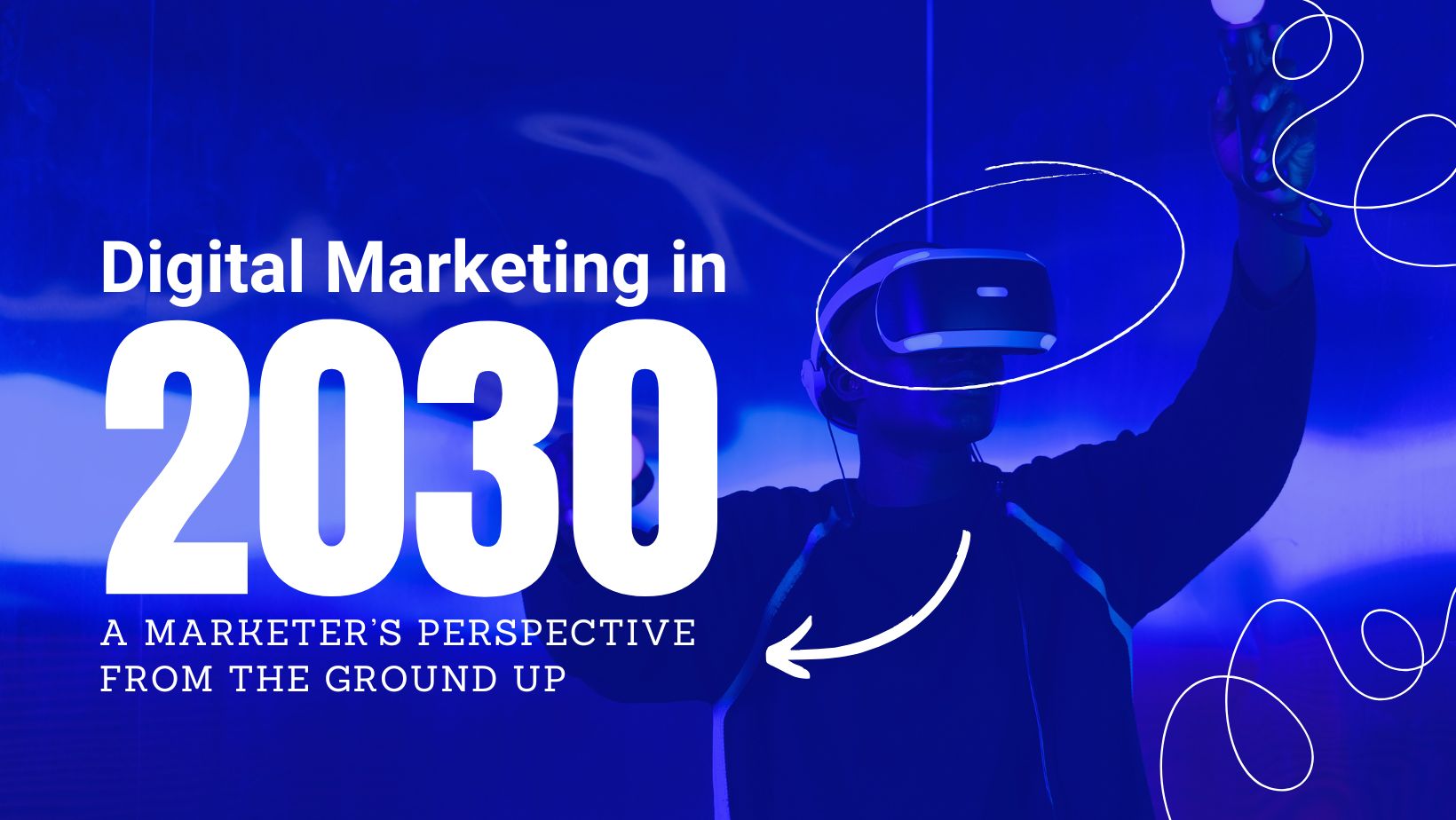By Swapnil Kankute – Certified Digital Marketer (12 Years Experience)
Back in 2013, when I began my journey in digital marketing, Facebook ads were still evolving, SEO meant stuffing keywords, and most Indian businesses were still trying to understand what an online presence meant. Fast forward to today, and digital marketing is at the center of every growth strategy. But what lies ahead? What will Digital Marketing in 2030 look like?
With over 12 years in the digital marketing industry, including a decade of hands-on experience in corporate and IT environments, I’ve seen trends come and go. I’ve tested strategies, built automation systems, and worked closely with real estate firms in Ahmedabad and small businesses in Chhatrapati Sambhaji Nagar. Here’s my realistic, experience-driven look at the future of Digital Marketing in 2030.
Table of Contents
ToggleFrom Campaign Managers to AI Co-Pilots
Today we use tools like Meta Ads Manager and Google Performance Max. In Digital Marketing in 2030, every business—even a local kirana store—will have access to an AI assistant that creates, optimizes, and manages entire campaigns in real time. These AI co-pilots will offer content ideas, real-time bidding suggestions, and conversion-focused design tweaks.
Still, the human marketer won’t be obsolete. Strategy, emotional intelligence, and storytelling will be even more crucial. Digital Marketing in 2030 will require marketers who can think creatively and lead with empathy.
Voice Search and Conversational SEO
Even today, voice search is growing. People don’t just type “best pest control Sambhaji Nagar” — they say, “Who provides pest control near me that’s affordable and fast?” In Digital Marketing in 2030, optimizing for voice search will become standard practice.
This shift means marketers must write in natural, spoken language. Websites, FAQs, and ads will need to reflect how people talk. Digital Marketing in 2030 will demand content that answers real-world, human questions.
Data Privacy: The Rise of First-Party Marketing
We are already seeing tighter privacy rules. Cookie tracking is declining. By Digital Marketing in 2030, we won’t rely on third-party cookies at all. This means:
- Building first-party databases through sign-ups, email subscriptions, and WhatsApp opt-ins
- Using CRM systems integrated with ad platforms
- Getting explicit consent from users before marketing
Marketers who start collecting first-party data now will lead the game in Digital Marketing in 2030.
Virtual Reality and Augmented Buying Journeys
Especially in high-ticket industries like real estate, I’ve seen buyers take virtual tours of properties in Ahmedabad and decide without ever visiting. Digital Marketing in 2030 will make virtual walkthroughs, AR demos, and metaverse experiences common.
But emotion will remain key. Just like in today’s market, the story you tell—the lifestyle you portray—will sell the product. Technology will support storytelling, not replace it.
Localized and Regional Content Will Dominate
As a marketer working with regional audiences in Marathi, Hindi, and Gujarati, I can confidently say that local content outperforms global English campaigns. In Digital Marketing in 2030, regional language marketing will be mainstream, not a niche.
This means:
- Creating content in the user’s mother tongue
- Using local references, festivals, slang
- Hyperlocal targeting in tier-2 and tier-3 cities
If you’re not speaking your audience’s language—literally and emotionally—you’ll be invisible in Digital Marketing in 2030.
The End of Vanity Metrics
Likes, views, and follows are still widely used today. But smart marketers are shifting focus to engagement, leads, and conversions. In Digital Marketing in 2030, metrics will be:
- Engagement time per post
- Conversion rate per ad spend
- Cost per lead across multiple channels
Analytics dashboards will be more advanced, but easier to read. Digital Marketing in 2030 will prioritize actionable insights over fluff.
Content Creation Powered by AI, Refined by Humans
AI tools like ChatGPT are already helping marketers save time. By Digital Marketing in 2030, AI will write first drafts, generate video scripts, create images, and even do voiceovers.
But human creativity will still matter. The best campaigns will be those where AI handles 80% of the grunt work and marketers spend their time refining and storytelling.
WhatsApp and Private Messaging Will Lead
Email is still effective, but WhatsApp is where most customers actually respond. In Digital Marketing in 2030, private messaging platforms will dominate customer communication.
We will see:
- Automated WhatsApp bots that guide users
- CRM-integrated messaging
- Personalized product recommendations
If your business isn’t on WhatsApp or similar platforms, it’s already behind.
Ethical Marketing and Digital Trust
In Digital Marketing in 2030, trust won’t be a marketing strategy — it will be the very foundation of every brand’s existence.
Consumers today are no longer passive audiences. They question, compare, and investigate before making a purchase. They install ad blockers, decline cookies, and research brand ethics. By 2030, this behavior will be even more amplified.
Why Trust Will Be the New Currency
With AI-generated content flooding the internet, and thousands of brands vying for attention, the only way to truly stand out will be by being honest, consistent, and human. Trust builds loyalty, increases retention, and generates word-of-mouth — a priceless asset in a saturated market.
Digital trust will impact:
- Ad click-through rates
- Email open and response rates
- Customer retention
- Overall lifetime value
Brands that earn and sustain this trust will outperform competitors who rely solely on promotions and discounts.
1. Respecting User Privacy
The days of tracking every user click without permission are over. By 2030, laws like GDPR and India’s Data Protection Act will be stricter. Brands must:
- Clearly state data collection policies
- Ask for consent at every step
- Let users control their data easily
Privacy-respecting brands will use first-party data to personalize content without being invasive. Trust will grow when users feel they’re in control.
2. Transparency in Pricing and Communication
Hidden charges, vague refund policies, or bait-and-switch offers will destroy a brand’s credibility in seconds.
Transparency means:
- Displaying complete pricing upfront
- Declaring limitations and T&Cs clearly
- Being honest about what your product/service can and cannot do
Reviews and comparison sites will become more sophisticated, and consumers will instantly know if a brand is exaggerating claims. Only truthful brands will thrive.
3. Delivering Value Before Asking for Sales
In Digital Marketing in 2030, customers expect value before conversion. They want free tools, tips, insights, and educational content — something that proves your expertise.
Giving value upfront builds reciprocity and trust. Content marketing, free trials, demo videos, webinars, and guides will continue to be powerful trust-building tools.
4. Ethical Use of AI
AI will generate most content and recommendations by 2030. But brands must:
- Declare when content is AI-generated
- Avoid deepfake-style manipulation
- Be accountable for AI errors or misinformation
If a user feels deceived by AI-driven campaigns, it’ll be near-impossible to win back their trust.
5. Human-Facing Customer Support
Automated chats and bots are efficient. But in critical moments, users still want human empathy. Ethical brands will:
- Balance AI and human support
- Resolve issues quickly, not just respond
- Offer multilingual support for inclusivity
Brands that hide behind automation will seem cold and disconnected.
6. Authentic Influencer Marketing
By 2030, influencer marketing will evolve to favor micro- and nano-influencers with niche credibility over mass reach. Transparency in paid collaborations will be mandatory.
Influencers and brands must:
- Disclose paid partnerships clearly
- Collaborate on products they actually use
- Prioritize long-term ambassadorships over one-off promos
7. Ethical Remarketing
Remarketing is powerful, but can quickly become creepy. Ethical remarketing means:
- Frequency capping (limit how many times someone sees your ad)
- Excluding audiences after a purchase
- Letting users opt out easily
Consent and context will be crucial in Digital Marketing in 2030.
Final Thought on Ethical Marketing in 2030
Ethical marketing is not about being perfect — it’s about being transparent, respectful, and human. Brands that embed these values into every customer interaction will not just survive Digital Marketing in 2030, they’ll lead it.
Trust is hard to earn, easy to lose, and impossible to fake. Invest in it today to build a brand that thrives tomorrow.
Shortform Video Will Evolve, Not Disappear
We all know Reels and Shorts are powerful today. But in Digital Marketing in 2030, these formats will evolve into:
- Shoppable short videos
- Voice-narrated shorts for accessibility
- AI-generated personalized reels based on user history
But again, quality > quantity. One well-scripted video will beat 20 random ones. Strategy wins.
Freelancers and Specialists Will Dominate the Workforce
In Digital Marketing in 2030, most marketing departments won’t be in-house. Instead, brands will work with:
- Freelance strategists
- Contract-based creatives
- AI tool consultants
This means new opportunities for skilled digital marketers who want to work independently.
What Will Stay the Same in Digital Marketing in 2030?
With all this change, a few things won’t change:
- Storytelling will always work
- Consistency will always beat random spikes
- People buy from people they trust
The tools will evolve, but the heart of marketing will stay human. And that’s the most exciting part of Digital Marketing in 2030.
Final Thoughts: How to Prepare for Digital Marketing in 2030
If you’re a business owner or marketer reading this in 2025, here’s what you should do now:
- Build first-party data (emails, phone numbers, WhatsApp)
- Learn AI tools but don’t over-rely on them
- Localize your content strategy
- Be present on private messaging channels
- Focus on building long-term trust
Those who prepare today will dominate tomorrow. Because Digital Marketing in 2030 is not a revolution; it’s an evolution for those who stay ready.



